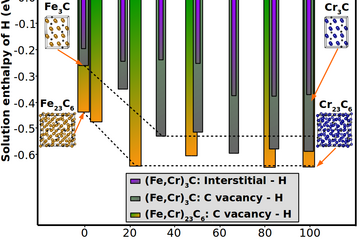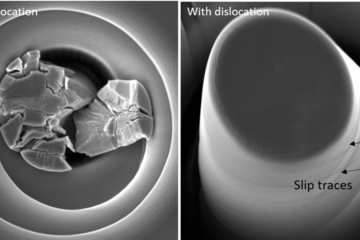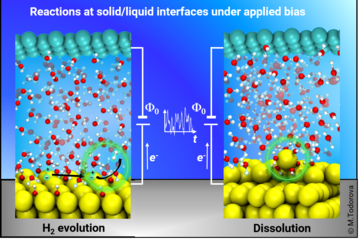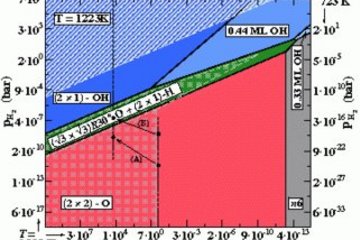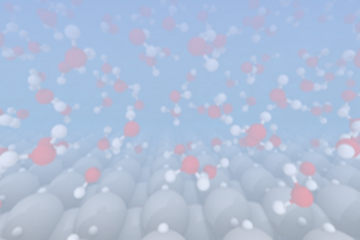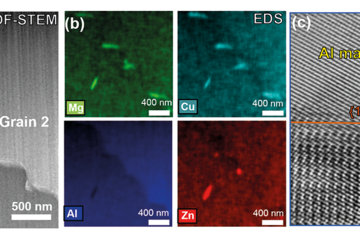All genres
461.
Teaching
Korrosion der Metalle. Lecture: Wahlpflichtvorlesung, Blockveranstaltung, SS 2006, Fakultät für Maschinenbau, Ruhr-Universität-Bochum, Germany
462.
Teaching
Werkstoffkundliche Exkursionen. Lecture: Veranstaltung SS 2006, Ruhr-Universität-Bochum (Fakultät für Maschinenbau), Germany
463.
Thesis - PhD
Investigation of Key Parameters in Cathodic Delamination of Organic Coatings and Quantification of Their Role. Dissertation, Ruhr-Univesität Bochum, Fakultät Maschinenbau (2023)
464.
Thesis - PhD
Elektrochemie von "trockenen" Metalloberflächen im Hinblick auf atmosphärische Korrosion. Dissertation, Ruhr-Universität Bochum (2023)
465.
Thesis - PhD
The hydrogen electrode in the “dry”: on the effect of electrode material and relative humidity. Dissertation, Ruhr-Universität Bochum, Fakultät für Maschinenbau (2022)
466.
Thesis - PhD
Self-heating coatings based on conducting polymer for intelligent corrosion protection. Dissertation, Ruhr-Universität Bochum, Fakultät für Maschinenbau (2022)
467.
Thesis - PhD
Investigation of the kinetics of selective oxidation of iron model alloys during simulated. Dissertation, Ruhr-Universität Bochum (2020)
468.
Thesis - PhD
Absolute Electrode Potentials - The Thin Film Electrode. Dissertation, Ruhr-Universität Bochum (2019)
469.
Thesis - PhD
Release and transport of corrosion inhibitors in self-healing coatings for intelligent corrosion protection. Dissertation, Ruhr-Universität Bochum (2019)
470.
Thesis - PhD
Investigation of the “Protection Zone”, a novel mechanism to inhibit delamination of composite organic coatings containing conducting polymer. Dissertation, Ruhr-Universität Bochum (2019)
471.
Thesis - PhD
The Principle and Applications of Scanning Kelvin Probe based Hydrogen Detection Technique on Pd-coated and Oxide Covered Surface. Dissertation, Ruhr-Universität Bochum (2019)
472.
Thesis - PhD
Hydrogen Permeation based Potentiometry as a New Quantification Tool for Electrochemical Reactivity at Buried Interfaces and under Nanoscopic Electrolyte Layers. Dissertation, Ruhr-Universität Bochum, Bochum, Germany (2017)
473.
Thesis - PhD
Regenerative Nanocomposite-Coatings tailored for Smart Corrosion Protection. Dissertation, Ruhr-Universität Bochum, Fakultät für Maschinenbau, Bochum, Germany (2017)
474.
Thesis - PhD
A contribution to understanding interfacial adhesion based on molecular level knowledge. Dissertation, Fakultät für Maschinenbau, Ruhr-Universität Bochum, Bochum, Germany (2016)
475.
Thesis - PhD
From Microbially Induced Corrosion to Bioelectrical Energy Conversion - Electrochemical Characterization of Sulfate-Reducing Bacteria and Methanogenic Archaea. Dissertation, Fakultät für Chemie und Biochemie der Ruhr-Universität Bochum, Bochum, Germany (2014)
476.
Thesis - PhD
Lithiation and delithiation mechanisms of model anodes for lithium ion batteries using the example of Au thin films: Correlation of electrochemical and in-situ high energy X-ray diffraction characterization. Dissertation, Fakultät für Chemie und Biochemie, Ruhr-Universität Bochum, Bochum, Germany (2014)
477.
Thesis - PhD
Combinatorial screening of fuel cell catalysts for the oxygen reduction reaction. Dissertation, Fakultät für Chemie und Biochemie, Ruhr-Universität Bochum, Bochum, Germany (2014)
478.
Thesis - PhD
Design and implementation of an automated electrochemical flow system coupled with mass spectrometry for investigation of the dissolution behavior of platinum. Dissertation, Fakultät für Chemie und Biochemie, Ruhr-Universität Bochum, Bochum, Germany (2014)
479.
Thesis - PhD
Element resolved corrosion analysis of stainless steel-type glass forming steels and the correlation to their microstructure. Dissertation, Ruhr-Universität Bochum, Bochum, Germany (2013)
480.
Thesis - PhD
Monitoring of the oxide-chemistry controlled surface ion mobility. Dissertation, Fakultät für Maschinenbau, Lehrstuhl Werkstoffwissenschaft, Ruhr-Universität Bochum, Bochum, Germany (2013)




